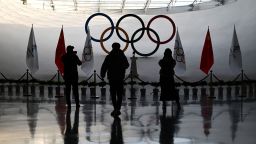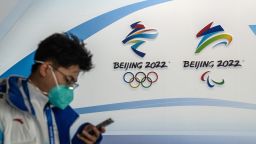The State Department has shared information about China’s human rights abuses with US Olympic athletes and defended athletes’ right to express opposition to those violations on the eve of the Winter Olympic Games in Beijing.
“US athletes are entitled to express themselves freely in line with the spirit and charter of the Olympics, which includes advancing human rights. We call on the PRC to respect human rights and fundamental freedoms, including that very freedom of expression,” State Department spokesman Ned Price said Wednesday.
The Olympic Charter’s Rule 50 dictates that “no kind of demonstration or political, religious or racial propaganda is permitted in any Olympic sites,” but it does not prohibit voicing concerns on social media or during media interviews.
Yet in recent weeks, a Chinese official on the Beijing organizing committee warned against any expression that is “against the Olympic spirit” without acknowledging that the rule doesn’t prohibit freedom of expression outside Olympic sites.
It remains unclear what kinds of protests athletes might partake in, but the comments could have a chilling effect on some athletes.
“We’ve already heard a direct threat from the Beijing organizing committee threatening ‘certain punishments’ for those who engage in political speech that violates the spirit of the Olympics, as the Chinese official put it, and they have not walked back those comments. Those threats stand,” said Bennett Freeman, who is a member of the Coalition to End Forced Labor in the Uyghur Region. “But the IOC rules do not prohibit athletes from speaking freely to the press.”
“I think we have to support those who do speak out and we have to respect the decisions of those who don’t,” Freeman said.
The US has said that China is committing genocide and crimes against humanity against Uyghur Muslims and ethnic and religious minority groups who live in the northwestern region of Xinjiang. China has also silenced dissent, taken political prisoners and set up invasive surveillance of its population.
China has called for the US to “stop interfering” with the Olympics.
The Biden administration, which has announced a diplomatic boycott of the Olympics, has forcefully rejected any suggestion that the US has coordinated a global campaign related to participation. American athletes will still participate in the Games.
“We know that the PRC uses disinformation to veil ongoing genocide in Xinjiang and other human rights abuses. We know that the PRC has made various accusations, including against US athletes, and we know that’s what’s going on here,” Price said.
The State Department provided briefings to Team USA athletes on safety and security in Beijing – as well as the PRC’s atrocities and human rights abuses last summer – leading up to the Games, a department spokesperson said.
A Chinese lawyer, Teng Biao, welcomed the efforts to inform athletes of China’s human rights abuses.
Team USA athletes, Biao said, “can’t say they don’t know” about China’s widespread human rights abuses.
“They have this special responsibility to say something,” Biao said.
Biao was detained by the secret Chinese police authorities and threatened around the time of the 2008 Summer Olympics in Beijing after speaking out against human rights abuses by the PRC. He said his passport was confiscated and his law license was revoked around the times of the games.
“We don’t encourage Chinese athletes or the Chinese people to protest or to speak out during the Olympics. That will be too dangerous,” Biao said, adding that foreign athletes should not exaggerate the risk they may face in speaking out. “For the American athletes, for the foreign athletes, it will be it will be OK if they say something in China.”
The State Department has about two dozen diplomatic security agents in Beijing to provide protections for the US athletes, as is routine for any Olympic Games, explained a State Department official.
The US is not particularly concerned about Beijing going after athletes who speak out against human right abuses because of how poorly it would reflect on the Chinese government, the official said.
But exactly when or where athletes might express their opposition is still unclear, and any planning is being held very closely, human rights activists told CNN.
International Olympic Committee President Thomas Bach refused to condemn China’s treatment of Uyghurs when asked about the situation during a news conference in Beijing on Thursday.
“We are not commenting on political issues, because otherwise if we are taking a political standpoint and we are getting in the middle of tensions and dispute and confrontations of the political powers, then we are putting the games at risk,” Bach said.
The position that the IOC has asserted – along with its refusal to address the allegation that official Olympic merchandise could have been made with forced labor in China – has left human rights activists angry.
“Mr. Bach, your neutrality collides with morality and morality lost,” Freeman said Thursday in Washington, DC. “Human rights are not neutral; they are universal. Your icy indifference to human rights is chilling.”



